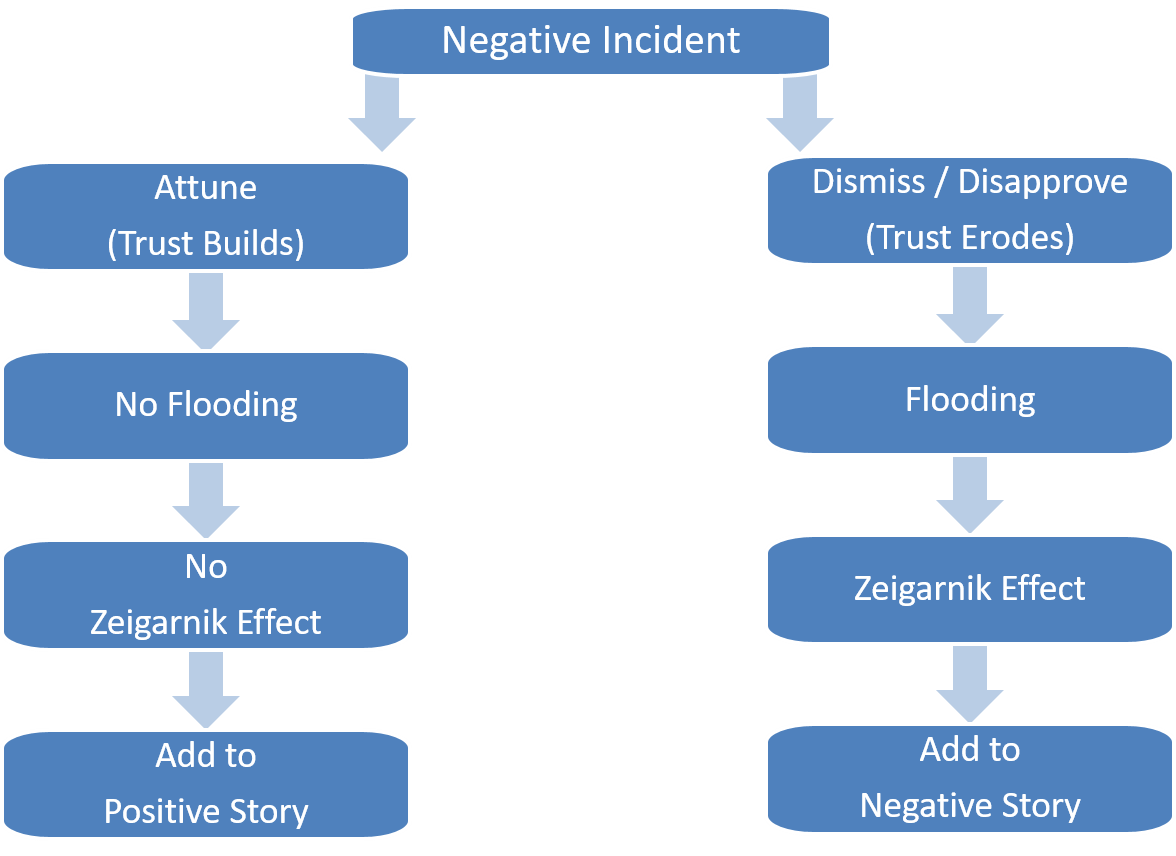Have you ever gotten into a big fight with your spouse and not handled it very well? I don’t think I know many couples that can say no to that. If you go back and repair the damage, it’s easy to move on.
What happens if you don’t repair the damage? Usually, this ends up as a potentially unsolved issue that leads to resentment and creates a landmine waiting to explode.
Dr. John Gottman in his book, The Science of Trust, describes two ways to manage conflict that lead to a positive outcome or a negative outcome. You can look at the diagram on the web page to understand the steps that lead one way or another.
Conflict starts with a negative incident. This can be something simple. It could be a wrong word or a wrong action. Our partner may be upset about something. When our partner does something like that, we can choose how we react. There are two paths you can follow.
Attunement or Dismissal?
You can either find attunement and validate your partner’s feelings, or you can dismiss or disapprove of the emotion.
Attunement is what happens when we validate their emotions. Have you experienced a time when someone really understands your feeling? That was attunement. It was empathy. It feels like they really understood what we are experiencing.
You could say, “That sounds like you’re really hurt and angry. Tell me more about that.”
When someone understands our emotion and empathizes, it helps the emotion to be soothed. You might still be upset, but you feel that your partner is there for you. When your partner is there for you, trust builds.
The opposite of attunement is when someone dismisses or disapproves of your emotion. It feels like they aren’t there for you. Instead, it may feel like they are putting you down or not caring. When this happens, trust erodes.
A Lack of Attunement Quickly Turns to “Flooding”
When our partner isn’t there for us, we may become flooded. Flooding is the emotion of feeling threatened. You have all experienced this. Our heart rate increases and blood pressure goes up. Adrenaline floods our body.
In our brain, our frontal cortex takes a backseat, and our limbic alarm system takes over. This is the fight, flight, or freeze response. We want to attack or withdraw. It becomes more difficult to listen. Physically, our frontal cortex isn’t engaged. Creativity, humor, empathy, and problem-solving become impaired. We cannot solve a problem in this state.
The way to get out of this response is to soothe yourself. Maybe your partner can empathize and help you, but the most effective way is to take a time out for at least 20 minutes. Use that 20 minutes to calm your emotional reaction.
If we have empathized and attuned to our partner, they are less likely to become flooded. If they become flooded AND then take a time out, it’s critical to come back to the dialog and repair the damage. Otherwise, you go to the next phase in the conflict path.
No Zeigernik Effect or Zeigernik Effect?
It says in Ephesians 4, “Be angry and do not sin; do not let the sun go down on the cause of your anger. Do not give the devil an opportunity.”
I think this is because if we fail to resolve issues, then they tend to be remembered and can cause resentment.
Psychologists have called this the Zeigernik effect.
In 1922, a petite 21-year old newlywed Jewish woman named Bluma Zeigarnik sat in a café in Vienna. She watched servers remember huge orders without writing them down. She became fascinated by this. When she went to interview them afterward, they didn’t remember the order at all. This became known as the Zeiganek effect.
Studies have found that we have a 90% better recall for unfinished events than for events that we have processed.
If we do not process our emotions, our brains tend to place that in our emotional memory. We remember unresolved emotional trauma. Next time, we can become triggered, and we’ll be flooded more quickly. Negative emotions do not vanish by being banished.
Add to the Positive Story or the Negative Story?
If we have attuned to one another in our conflict, we are more likely to have processed the emotion, and our brain puts it away. There is no lasting effect. If we do not repair, we have more likelihood of having that emotion trigger us.
Now, our brain thinks back on the incident and makes a conclusion. If we have resolved the emotions, we are more likely to come to the belief something like, “Yes, we got into a fight, but my partner was just stressed. My partner is there for me, and we can resolve our issues.”
This type of thinking adds to our positive story.
When the emotions go unresolved, we are more likely to turn this over and over in our head. We are more likely to start believing, “My partner is selfish. There is something seriously wrong with my partner.” This starts to impact our negative filters. We can think, “Even when they do something nice, it’s only because they want something.”
This type of thinking adds to our negative story.
We have a choice of how we respond to negative incidences. We can attune to our partner, resolve the issue before they become too upset, let our brains put it way, and add to our positive story. The other path is to dismiss or disapprove of our partner’s emotions. Then, they become flooded. If we fail to repair, this adds the incident to our emotional memory. Then, we add to our negative story.
Negative stories and beliefs lead to resentment. These stories become the view of our relationship. We create a positive spiral or a negative spiral.
Tips for Marriage Mentors:
- Teach couples about attunement – Help couples to learn to empathize and validate their partner’s feelings.
- Teach couples to take a break – When we become flooded, we cannot engage in healthy dialog. Take a break and soothe your emotions.
- Help couples recognize this pattern – If couples can recognize their conflict pattern, they can then take steps to choose a different outcome and find attunement.


